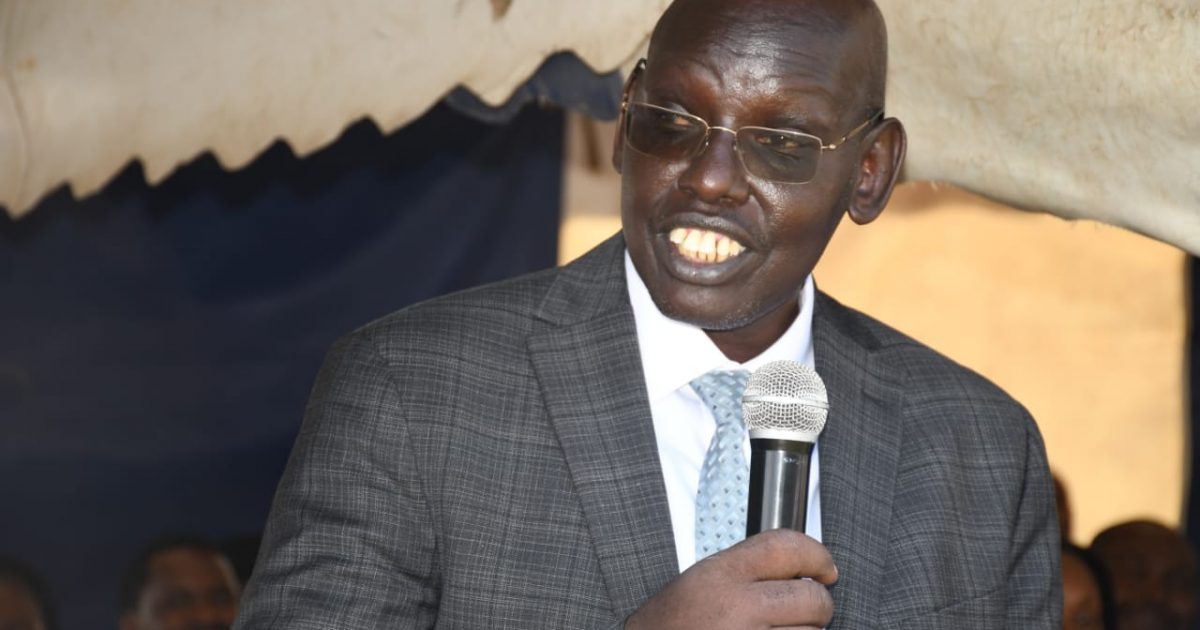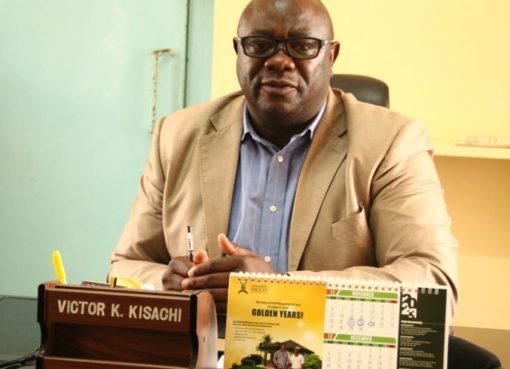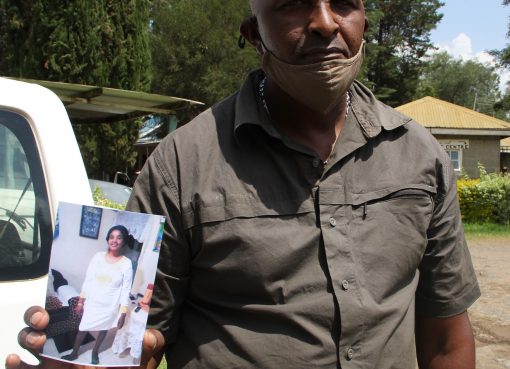The government will construct 16,000 classrooms in preparation for the enrolment of Grade Nine learners next year, Basic Education Principal Secretary Dr. Belio Kipsang has announced.
According to Dr. Kipsang, the ministry is making the necessary preparations in readiness for Grade Nine, which will be domiciled in primary schools. He disclosed that the government will provide Sh3.9 billion for the project.
Dr. Kipsang, who spoke at the Rift Valley Regional Commissioner’s plenary hall in Nakuru, is leading a team of 11 principal secretaries from the Social Sector Sub-Committee on a public engagement in the Rift Valley region over their views on the government’s service delivery plans. From Nakuru, the team will move to Baringo County.
The Principal Secretary stated that 766 new classrooms will be constructed in Nakuru at a cost of Sh770 million, adding that by December this year, all the 16,000 classrooms earmarked for grade nine will be ready for learning.
He revealed that the World Bank will provide an additional Sh9 billion towards the construction of 9,000 classrooms.
Additional classes will be built by legislators under the National Government Constituency Development Fund (NG-CDF) kitty.
“We are taking steps to ensure that our schools have the necessary infrastructure, where our teachers and learners can effectively perform,” Dr. Kipsang said.
The pioneer class of competency-based curriculum (CBC) will join Grade 8 in January.
The announcement by the PS comes amid concern by some stakeholders over the lack of capacity by primary schools to accommodate junior secondary schools (JSS).
He urged the youth to consider enrolling in technical vocational education training (TVET) institutions.
The PS said that even candidates with an ‘E’ grade have the opportunity to qualify for university through the TVET pathway without meeting the traditional minimum university entry grade of C+.
He noted that the state is revamping the Technical, Vocation, Education, and Training (TVET) system to meet the growing industrial and labour market needs of the country.
Dr. Kipsang indicated that TVET is a powerful tool to prepare youth for the labour market and provide lifelong learning opportunities to adults.
The national government programmes, he added, currently require individuals with skills that are within the value chain of building and construction, especially in affordable housing construction.
The PS noted that the Kenya Kwanza government is banking on the TVET sub-sector to spur industrialization in Kenya.
“This explains the reason we have invested heavily in the sector so as to initiate a socio-economic revolution. The new funding model in TVET institutions will ensure equity and access to TVET courses for all learners, leaving no one behind,” said Dr. Kipsang.
In the 2023–2024 budget, TVET institutions were allocated Sh28.3 billion.
Dr. Kipsang called on the business community to proactively pay their taxes, further urging them to champion compliance initiatives to enable the government to collect taxes and provide critical services and development programmes.
“I want to encourage everyone to be patriotic and pay their correct share of taxes. This will create a fair and competitive business environment, grow our economy, and enable us to be self-reliant,” he said.
Social Protection and Senior Citizens Affairs Principal Secretary Joseph Motari said the government is sourcing funds to pay carers to the elders under the Inua Jamii Cash Transfer Programme.
During the registration of elderly and disabled persons, each beneficiary must have a carer who plays the role of helping them withdraw the funds in case such a beneficiary suffers from sight, illiteracy, or mobility challenges.
Motari affirmed that all elderly persons in the cash transfer programme will be enrolled, saying this will ensure all elderly persons are cushioned against a harsh economic environment.
According to the PS, the government has so far enrolled over 1.9 million people in the cash transfer programme.
“We had 1.2 million last year, and this year we have registered another 500,000. We have an additional 194,000 whom we expunged from the register because they didn’t exist, and now we are replacing them,” said Motari.
“The government has developed a strategy to progressively increase the number of older persons to benefit from the programme,” added the PS.
He disclosed that the government spends Sh32 billion annually on the Inua Jamii cash transfer programme.
Gender and Affirmative Action Principal Secretary (PS) Anne Wang’ombe advised persons living with disabilities, women, and youth to tender for government contracts and bids under the Access to Government Procurement Opportunities (AGPO) programme.
She stated that the government had released Sh1.5 billion to facilitate bursaries and grant disbursements to affirmative action groups across all 47 counties through the National Government Affirmative Action Fund (NGAAF).
Ms. Wang’ombe said the funds meant for the third and fourth quarters of the 2023–2024 financial year will cover school bursaries for learners from vulnerable households.
The PS underscored the government’s unwavering commitment to improving the livelihoods of affirmative action groups and enhancing access to financial facilities and services.
“The grants are meant to increase disposable income levels for the beneficiaries for improved livelihoods through enterprise development,” the PS noted.
Group members who are set to benefit from the grants are those who successfully submitted their applications and attained the eligibility criteria for funding through the NGAAF County offices.
About 25,000 students from across the nation are also set to benefit from bursaries and scholarship allocations amounting to Sh273 million to support their education and skill development.
The fund has disbursed Sh677 million to implement various projects and programmes that would benefit a cross-section of the inhabitants in selected communities in the 47 counties.
“NGAAF will continue to support the prevention and response to sexual and gender-based violence through the construction of GBV centres, the nurturing of talents, the provision of water facilities, and other social amenities meant to provide an enabling environment for businesses to thrive,” Wang’ombe said.
Through the kitty, NGAAF has allocated Sh137 million for civic education to sensitise community members on various government programmes and policies to ensure increased uptake of government programmes.
Principal Secretary, State Department for Medical Services, Mr. Harry Kimtai, announced that Kenyans will start paying 2.75 percent of their gross salary to the Social Health Insurance Fund (SHIF) next month under the new Social Health Authority (SHA).
He said the rollout of the new health scheme will go on as earlier planned, adding that the full transition from the National Health Insurance Fund (NHIF) to the Social Health Authority (SHA) is scheduled to start on July 1, 2024.
To facilitate the transition, he added, the Ministry of Health will spearhead a mass registration drive across all 47 counties, beginning June 21.
Mr. Kimtai urged all Kenyans to participate in the exercise, which aims to include Kenya among the nations with universal health coverage.
“Kenyans can register by phone, at all public hospitals, and through the 100,000 Community Health Promoters across the country.”
The new health fund will see the country fully transition from the current NHIF system, with every Kenyan required to contribute 2.75 percent of their income to the fund.
The PS stated that the government will consider the economic circumstances of unemployed or self-employed Kenyans to determine their contributions to the fund.
“By contributing to the Social Health Insurance Fund, we shall be making access to healthcare services affordable to every Kenyan,” he said.
He added: “With the new regulations in place, every Kenyan shall be required to apply to the Social Health Authority for registration as a member before June 30, this year. Services under the new health scheme will be available from July 1.”.
The new health scheme will repeal NHIF and begin offering services to Kenyans by July 1. “We have made the registration so easy; one can register through the mobile phone through a USSD code, with the help of a Community Health Promoter (CHP), or just walk to a nearby health facility to get enlisted,” he said.
The PS said the exercise will ensure a smooth transition from NHIF to SHA, adding, “Transition exercises should be seamless. The public should not realise there has been a handshake unless at a point of service delivery.”
By Anne Mwale




